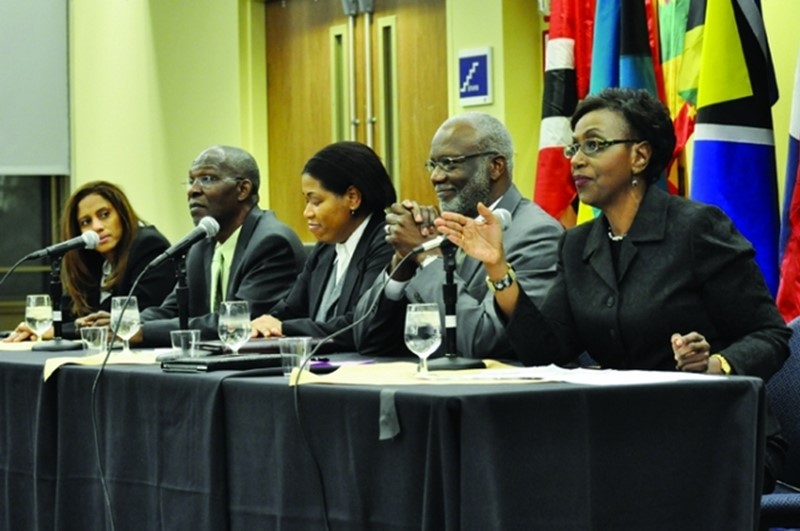
As the head of government in an Overseas British Territory, McKeeva Bush would have been very familiar with the phrase annus horribilis which the Oxford English Dictionary said had been in use as early as 1985, but gained prominence when Queen Elizabeth used it to describe the controversies that marked the 40th anniversary of her Accession in 1992.
For Bush, the 57-year old leader of the United Democratic Party (UDP) and serving his seventh term in the Legislative Assembly in the Cayman Islands, 2012 was indeed his annus horribilis.
He became the first head of government in modern Caribbean history to be detained by police on suspicion of theft in connection with financial irregularities relating to the alleged misuse of a government credit card, breach of trust, abuse of office and allegedly importing explosive substances without valid permits on or before February 2012.
Following his detention, the embattled Bush saw his first five-year term as premier come crashing down in mid-December after legislators, including members of his own government, voted in favour of a no confidence motion against his administration.
Ironically, no charges have yet been laid against Bush, who remains out on police bail until February 2013. The island's British Governor, Duncan Taylor, has given an assurance that the police will "carry out a robust, fair and comprehensive investigation regardless of the individual concerned.
However, Bush, who has had several run-ins with London since coming to power in 2009, regards his arrest as nothing short of a very vindictive political witch-hunt," insisting I would just say that I have done nothing wrong.
I have made a lot of friends and I have made a lot of enemies. There are a lot of jealous people in a very small island, he added.
But Bush was not the only head of government shown the exit sign in 2012.
After leading his Free National Movement (FNM) into defeat in the general elections in March, Hubert Ingraham bowed out of politics in the Bahamas.
I shall return to private life from whence I came, he said, soon after the Progressive Liberal Party (PLP), headed by Perry Christie, won what it termed the most important general elections since 1967.
Christie, who previously served as prime minister from 2002 to 2007, would later say the voters clearly felt that the policies of the FNM were not in their best interest and relegated them to second class citizens.
This is not a victory for the Progressive Liberal Party, but for the Bahamian people, he added.
Another PLP, this time in Bermuda, was not so fortunate. The 18-month-old One Bermuda Alliance (OBA) led by businessman Craig Cannonier prevented the Progressive Labour Party from extending its 14 year rule and in the process sent premier Paula Cox, former premier Dame Jennifer Smith and economy, trade and industry minister Patrice Minors packing out of the 36-member parliament. Cox has since resigned as PLP political leader.
In Belize, Prime Minister Dean Barrow dodged the bullet when his United Democratic Party (UDP) won the March 7 general election by one seat despite losing eight seats to the opposition People's United Party (PUP).
While no other Caribbean country went to the polls in 2012, political machinations and survival strategies kept some governments in office.
In Guyana, where the opposition parties control 33 of the 65 seats in the National Assembly, legislators from all sides sought to garner support from the international community during 2012 over what they claimed to be relentless attacks on parliamentary democracy in the Caribbean Community (CARICOM) country.
Frustrated by the opposition's strategies, the government of President Donald Ramotar went to the courts in a bid to overturn decisions initiated by the opposition and has also called on the international community to monitor and consider statements and postures it may wish to make in support of the protection of parliamentary democracy and the legitimacy of the democratically elected government in Guyana.
On the other hand, the opposition grouping, A Partnership for National Unity (APNU), which also includes the People's National Congress Reform (PNCR), said it was condemning the ruling People's Progressive Party/Civic administration for its relentless attacks on the Leader of the Opposition, the Speaker and Opposition members of the National Assembly.
In Grenada, Prime Minister Tillman Thomas got Governor General Sir Carlyle Glean to prorogue parliament in the face of a second vote of no confidence in 2012. The first, filed in April, had been brought by the main opposition New National Party (NNP) of Dr. Keith Mitchell and although the National Democratic Congress (NDC) closed ranks in defeating the motion, the second in September was brought by Thomas's former foreign affairs minister Karl Hood.
Like Bush, 2012 has turned out to be an annus horribilis for Thomas, who came to power in 2008 leading the NDC to an 11-4 victory at the polls.
In September, the 66-year-old NDC leader accused several party members including former tourism minister Peter David, Hood and prominent trade unionist Chester Humphrey of working in cohorts with the opposition NNP, resulting in their expulsion.
The move further crippled the NDC, which saw its majority in the parliament dwindle to six and the subsequent formation of the National United Front (NUF), comprising many of the expelled NDC members, who are now promising to provide an alternative to the NDC and the NNP.
You have finally found a party you can vote for in 2013, said former environment minister Glynis Roberts, adding we do not have all the answers for Grenada, but in moving forward, we are declaring that we do not want to any longer be part of the problem.
Despite calls for Prime Minister Thomas to re-convene parliament, Grenada ended 2012 without a parliamentary sitting since July.
The island's constitution notes that the parliament must have at least one sitting during a six-month period - failure to do so, could result in the Head of State dissolving parliament and ordering a fresh election.
Unlike his counterpart in Grenada, the St. Kitts-Nevis Prime Minister Dr. Denzil Douglas is not perturbed at a motion of no confidence filed against him and his government by Opposition Leader Mark Brantley.
In fact, a confident Dr. Douglas, who was unable to present his 2012-2013 national budget as scheduled in December because two of his senior ministers, including Deputy Prime Minister Sam Condor, were not attending budget meetings, said there were many other important matters to come before the parliament.
"There is a procedure that has to be followed here, he said, adding and so if there is a motion now to be heard, it will have to wait in line with what is the calendar of the House that is before the Speaker of the House.
But Brantley has written to the Speaker Curtis Martin urging that a date be set for the debate.
I have been inundated with requests from the press and fellow Commonwealth parliamentarians as to how this motion of no confidence is progressing and I propose to keep them fully advised as to these critical developments in the life of our democracy and our National Parliament, Brantley said.
However, the Opposition Leader may have to keep his eyes on the situation unfolding in Nevis, where Premier Joseph Parry has indicated he will call a general election to elect a new government to run the Nevis Island Administration (NIA).
Parry's move comes in the wake of the OECS Court of Appeal ruling on August 27, which upheld an earlier decision by the High Court that had declared the results of the July 11, 2011 Nevis Island Assembly (NIA) elections in the St John's seat null and void.
Former deputy premier and social affairs minister, Hensley Daniel of the incumbent Nevis Reformation Party (NRP), had won the seat by defeating Brantley by 14 votes.
The court has kept Dominica's Prime Minister Roosevelt Skerrit in power even as the main opposition United Workers Party (UWP) kept up a relentless legal battle in 2012 to have him removed.
The UWP, through its former leader Ron Green and defeated candidate, Maynard Joseph, has filed an appeal against the January ruling by High Court judge Gertel Thom that they failed to establish a case against Skerrit and his Education Minister Petter Saint Jean. The opposition politicians have been challenging the nomination of the two government ministers who won their seats in the 2009 general election.
In the Dutch-speaking CARICOM country of Suriname, the courts are also playing a role in whether or not President Desi Bouterse remains in office.
His trial and that of others implicated in the deaths of 15 prominent people who were opposed to the then military government in 1982, has been postponed amid further uncertainty as to whether the court could continue hearing evidence in light of the recent passage of an amnesty law.
The trial was due to re-start on December 12, but the Prosecutor's Office announced that it was awaiting a ruling from the Constitutional Court on the amnesty law resulting in Judge Cynthia Valstein-Montnor having to postpone the matter to a later date.
The trial had been halted in May after the National Assembly approved the controversial Amnesty Law that could pardon all the suspects in the December 1982 murders.
Former Turks and Caicos Islands premier Michael Misick in 2012 also came to understand the phrase, You can run but you cannot hide after he was arrested at the Santos Dumont Airport in Rio de Janeiro by Brazilian Federal Police.
INTERPOL had issued an international warrant for Misick, who also found himself the subject of a warrant issued by the Brazilian Supreme Court. His arrest was sought in relation to an ongoing investigation by the Turks and Caicos Islands authorities into issues uncovered during the Sir Robin Auld's 2008-09 Commission of Inquiry regarding alleged corruption and maladministration.
Misick was implicated in large-scale corruption in Turks and Caicos that led to the suspension of the democratic government in the TCI by the United Kingdom. He faces several serious charges relating to corruption and maladministration.
A confident Barbados Prime Minister, Freundel Stuart, predicted this year that his ruling Democratic Labour Party (DLP) will be returned to power when it faces the electorate in the 2013 general election.
We will win the next general election and with your full support we will resolve to do so in a convincing manner, Stuart told supporters at the party's 57th annual conference, acknowledging that although victory may be ours for the taking he was warning supporters it is not going to come easy.
Stuart, who took over the party and government following the death of then prime minister David Thompson in 2010, said that the DLP which came to power in 2008, was quietly getting its election machinery in place and acknowledged that the state of the economy, despite the ongoing global crisis, remains stable.
The DLP's main challenge will come from the Barbados Labour Party (BLP) headed by former prime minister Owen Arthur, who during 2012, has been critical of the socio-economic policies of the government.
Prime Minister Kamla Persad-Bissessar does not have an election to face until 2015, but for certain, one campaign issue surfaced during 2012, despite pleas from the four-party coalition People's Partnership government for the country to move on.
The government has found it virtually impossible to shake off public criticism led by the main opposition People's National Movement (PNM), civil society and non-governmental organisations that the decision to proclaim early, Section 34 of the Administration of Justice (Indictable Proceedings) Act, was to ensure the freedom of two government financiers.
Street demonstrations calling for the dismissal of the Attorney General Anand Ramlogan, the dismissal of justice minister Herbert Volney, a former high court judge over their roles in the ongoing controversy, have done little to appease the critics, who are now supporting a request by President George Maxwell Richards for Prime Minister Persad-Bissessar to furnish him with details leading to the early proclamation of the section.
The Prime Minister has responded but the contents of her letter were not disclosed since she said it had been sent under confidential cover.
In September, parliament repealed the controversial section that had the effect of allowing anyone, whose trial has not started after a 10-year period to walk free and a verdict of not guilty entered against their names.
Critics said that the clause was aimed at supporting businessmen Ish Galbaransingh and Steve Ferguson, who have been described as financiers of the ruling United National Congress (UNC), the biggest partner in the four-member coalition government.
The two are facing fraud and laundering charges relating to the re-development of the Piarco International Airport in 2001. They are also wanted in the United States on a number of related charges.
For the first time in its 66-year history, the main opposition Antigua Labour Party (ALP) does not have a Bird at its helm. Gaston Browne defeated former prime minister and Opposition Leader Lester Bird by a 213-180 margin but the leadership is not far off from the Bird family circle, as Browne also announced he will marry on April 24, next year, Maria Bird ÔøΩ the niece of the now defeated leader.
Brown also said he intends making the 74 year-old leader, emeritus of the ALP.
Politics aside, the Caribbean continued to feel the impact of the ongoing global and economic crisis in 2012.
Jamaica had hoped to sign a new Stand By Agreement with the International Monetary Fund (IMF) by year end with the government insisting that it is committed to completing the accord that will be in the best interest of the country.
Prime Minister Portia Simpson Miller said the government's draft Letter of Intent would embody its commitments under a new agreement with the Washington-based financial institution.
The timetable is, therefore, not ours alone to set. The process is a very difficult and complex one. The negotiation requires us to do the best we can to ensure that we get an agreement that is in the best interest of Jamaica.
An agreement is very important for addressing the critical economic and social problems that the country now faces, she said, adding the agreement must ensure that we not only carry out strategic reforms, but also lay the foundation for sustainable growth.
An IMF delegation visited the island in late September for talks with government on the new accord but Finance Minister Dr. Peter Phillips later indicated that an agreement is yet to be reached.
But the main opposition Jamaica Labour Party (JLP) has already called on the government to lay on the table all the details regarding the discussions to the public so confidence can be increased.
Phillips said the IMF mission has broadly accepted the medium term programme which will underpin any deal.
The trade union movement has also called for full disclosure from the government on the fate of public sector workers under the proposed IMF deal.
Belize feared a bit better, with the government indicating in December it had reached an agreement with its creditors on restructuring the country's US$544 million foreign debt, also known as the super bond.
"This agreement is comprehensive, it is sustainable, and it will provide well in excess of US$150 million in relief to Belize," a relieved Prime Minister Barrow said, after bondholders had earlier rejected an offer from the government on restructuring the debt and said they had hired lawyers after the expiry of a reprieve on legal action.
St. Vincent and the Grenadines Prime Minister Dr. Ralph Gonsalves aware of opposition criticisms that the local economy had gone into recession, said despite the slow recovery of the international economy, his administration was making efforts to ensure that we have as much enterprise in the economic system to hasten the growth but we are also dependent very much on the vagaries of the international economy.
This government is not preoccupied in conjugating every possible verb connected to helplessness nor are we engaged in the declension of every single nerve which touches and concerns despondency, he said, seeking to assure nationals.
In St. Lucia, the government of Prime Minister Dr. Kenny Anthony launched a multi-million dollar stimulus package in a bid to turn around a sluggish economy.
Anthony said the construction stimulus programme would help address some of the worst financial conditions now being experienced in recent years and praised the private sector for contributing towards the reality of the fiscal package.
If we are going to cause the turnaround in the economy, then every single one of us has to make a sacrifice. We need each other and we need each other badly, he said. His government had earlier introduced the Value Added Tax (VAT) as a revenue earner in October.
Prime Minister Douglas, despite opposition criticism, maintained that the controversial Land for Debt Swap involving 1, 200 acres of State land in St. Kitts-Nevis would help ease the EC$900 million (One EC dollar = US$0.37 cents) owed to the National Bank.
"I want to emphasize that the Debt for Land Swap will reduce the Debt to GDP (Gross Domestic Product) ratio even further to well under 100 per cent, and create even more fiscal space so that we can accelerate growth-related development initiatives while modernizing and strengthening our social safety net programmes."
The countries of the Organisation of Eastern Caribbean States (OECS) were facing financial problems in 2012 with Antigua and Barbuda and Grenada for example, finding it extremely difficult to meet the monthly salaries to their public workers.
The US-based rating agencies, Standards & Poor's (S&P) and Moody's, downgraded several Caribbean countries including Barbados and the Bahamas during 2012, with S&P also downgrading the Barbados-based Caribbean Development Bank (CDB) long term rating to AA with a warning that the ratings could plunge even lower if a regional government borrower fails to clear its arrears with the financial institution.
S&P said that the decision to lower the ratings from AA+ to AA reflects embedded credit risks in CDB's loan portfolio.
Our view of the treatment of CDB as a preferred creditor by its borrowing member shareholders, which is established by practice, is a pivotal component of this analysis, it added.
The Caribbean tourism industry continued to show signs of recovery during 2012 fuelled by improvements in the United States and Canadian markets.
But Secretary General of the Barbados-based Caribbean Tourism Organization (CTO), Hugh Riley warned that the region continued to face challenges in Europe, particularly the United Kingdom market from which the numbers have been falling. He said visitor spending has also been sluggish.
In addition, the region continued its unsuccessful lobby against the Air Passenger Duty (APD), instituted in 1994 as a British environmental tax aimed at offsetting aviation's carbon footprint. ÔøΩThe Caribbean argues the tax makes travel to the region expensive for any family.
While the Caribbean was spared the widespread devastation of hurricanes in the past, in 2012, Hurricane Sandy and Tropical Storm Isaac brought death and destruction to Haiti, Jamaica and several other regional countries.
A plane crash in Antigua in October resulted in the deaths of two people, including the pilot of the Fly Montserrat plane, Jason Forbes.
In 2012, the region bade farewell to a number of its prominent citizens, including the renowned Guyana-born literary icon, Professor Jan Carew, the former Grenada prime minister George Brizan, the Dominica diplomat and former government minister Charles Maynard, former Trinidad and Tobago legislator and senior United Nations official, Angela Cropper, former Guyana police commissioner Henry Greene and the Dominica-born regional cricket administrator and cricket commentator, Tom Lafond


